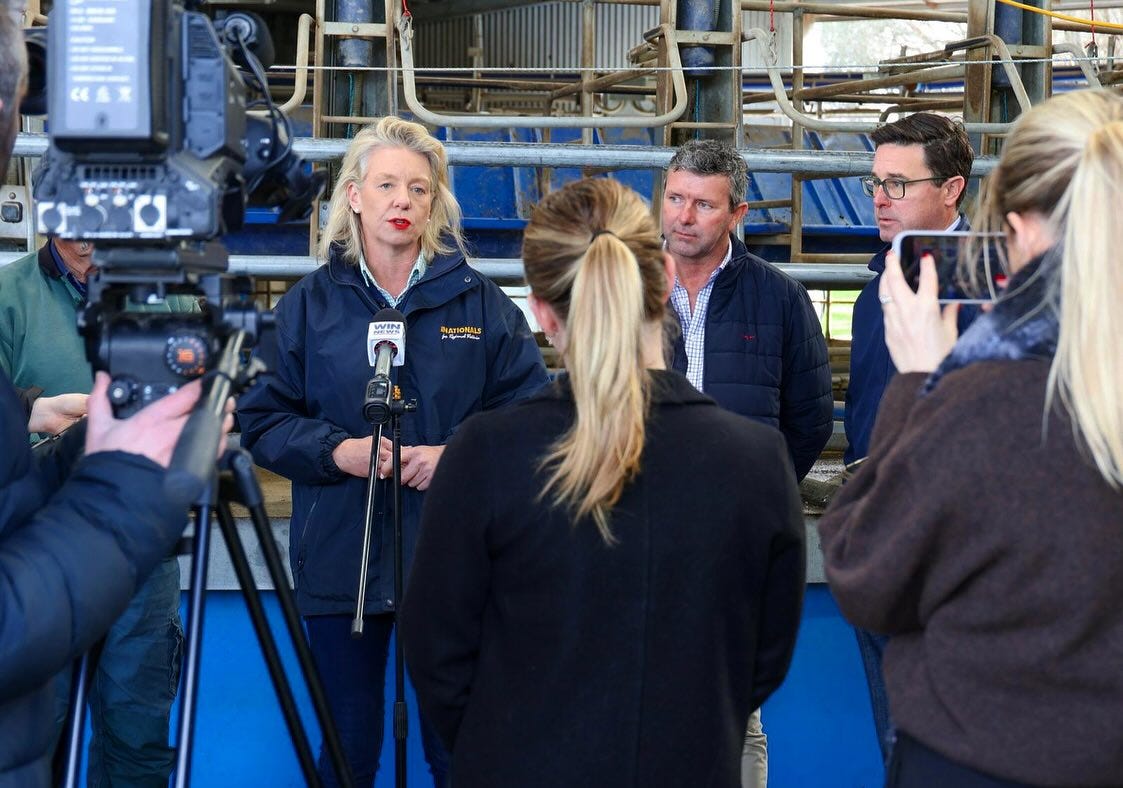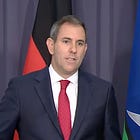Coalition Senator Slams Government for Shelving Major Economic Reforms as Productivity Hits 60-Year Low
National Senate Leader Bridget McKenzie accused the federal government Tuesday of abandoning its ambitious economic reform agenda, saying productivity has hit its "lowest point in 60 years" while critical reforms on industrial relations, energy and tax remain shelved.
Speaking on ABC's afternoon program with just two weeks until the Treasurer's Economic Reform Roundtable, McKenzie criticized the government for scaling back from what she called "the big three" reform areas despite holding a significant electoral mandate.
"I think we know that productivity is in the toilet. It's at lowest point in 60 years," McKenzie said. "The government's got a significant mandate, one that I believe they should use to really reform our economy and set us up for the future."
The Victorian senator said the Treasurer initially showed genuine excitement about economic reform, telling stakeholders to "bring me your ideas, let's get this show on the road." But instead of tackling major structural changes, McKenzie said the government has opted for a more limited agenda focused on regulatory reform.
"Unfortunately, instead of dealing with the big three - industrial relations, energy and tax reform - they've all been shelved," she said. "And now we've got the limited sort of agenda, shall we say."
McKenzie acknowledged that controlling regulatory growth is important but argued real productivity gains require addressing the fundamentals of industrial relations, energy costs for industry, and comprehensive tax reform.
"If you really want to drive productivity gains across an economy like ours, it is about industrial relations. It is about the cost of energy, particularly for our industrial sector, and tax reform," she said.
Tax Reform Debate Continues Despite Scaled-Back Ambitions
The government has received more than 900 submissions for its economic reform process, but McKenzie suggested many have been "stuffed in the bottom drawer, never to be opened again." She called for all submissions to be released publicly, saying "good ideas shouldn't be stuffed in the bottom drawer."
When pressed about specific tax reforms, including proposals to lower company tax rates to 20% for many businesses while potentially increasing taxes elsewhere, McKenzie said she supported a holistic approach to tax system changes.
"I don't think you can pull, as you said earlier, one lever in a tax system as complex as ours, where we've just put like a Sarah Lee, what is that, apple strudel? Layer upon layer," she said. "I do think you need a holistic look at the whole tax regime, company tax included, to actually look at it holistically."
McKenzie said everything should be "on the table" when it comes to tax reform, including contentious issues like negative gearing. She emphasized that tough decisions must be made based on evidence, calling on the Treasurer to "be brave" because "our economy needs it."
In her own transport portfolio, McKenzie highlighted specific challenges, noting Australia is "one of the most expensive countries in the world to build a kilometre of road" with costs significantly higher than international benchmarks. She also raised the need to ensure electric vehicle drivers pay their fair share for road maintenance, currently funded through fuel excise from petrol and diesel vehicles.
Bipartisan Support Emerges for AI Regulation
In a surprising show of cross-party agreement, McKenzie backed calls for strong artificial intelligence regulation, aligning with former Labor minister Ed Husic's support for an AI Act.
"Look, artificial intelligence, I think, comes with huge risks, both economic and social," McKenzie said. She expressed concern about the rush in both private and public sectors to replace human workers with AI in areas like law, accounting, HR and call centers.
McKenzie warned that AI poses risks beyond job displacement, potentially challenging fundamental aspects of human creativity and expression.
"We also run the risk of really challenging what it means to be a human, and that is our creative industries and the process of creating," she said. "Even for us, it's not just about the intellectual policy property piece, per se, but also the process of being a creative, writing a song, prose, creating a piece of art, a dance."
The senator, who describes herself as "a nat and a conservative" rather than a liberal, said protecting human creativity is essential regardless of economic benefits.
"That is part of being human. And I would hate to see that somehow be fritted away in a chase for some economic nirvana," she said.
McKenzie invoked the late physicist Stephen Hawking's warnings about AI, saying if "the man that created the physics we base this stuff on" was concerned about artificial intelligence, policymakers should carefully consider long-term impacts on humanity, not just short-term economic benefits.
"I think all of us need to be considering incredibly carefully not just the benefits, the short-term benefits, but the long-term impact on our very humanity," she said.
Truth matters. Quality journalism costs.
Your subscription to The Evening Post (Australia) directly funds the investigative reporting our democracy needs. For less than a coffee per week, you enable our journalists to uncover stories that powerful interests would rather keep hidden. There is no corporate influence involved. No compromises. Just honest journalism when we need it most.
Not ready to be paid subscribe, but appreciate the newsletter ? Grab us a beer or snag the exclusive ad spot at the top of next week's newsletter.
Personal Stakes Drive Policy Positions
McKenzie, who recently became a grandmother, said her personal investment in future generations influences her policy positions beyond immediate political considerations.
"I'm also a grandmother, so I have an interest in the future, not just next week's share price," she said, sending a greeting to her grandchild Henley Max during the interview.
When asked about supporting an AI Act specifically, McKenzie agreed with Husic's position despite their typical political differences.
"No, I think Ed's right. We don't agree on everything, but absolutely. It's something I think we should be looking at," she said.
She called for comprehensive public debate involving ethicists and experts to assess not just economic impacts but significant social consequences of AI adoption.
"Let's have a public debate, get the information, get the ethicists out, you know, and about not just is it going to be good for the economy," she said.
Coalition Offers Conditional Support for Reform
Despite her criticism of the government's scaled-back approach, McKenzie indicated the Coalition would support meaningful economic reforms if the government chooses to pursue them.
"We, as a coalition, are obviously going to support positive measures to do that," she said, referring to economic reform efforts.
However, she emphasized that substantial reform requires political courage and willingness to have difficult conversations with traditional stakeholder groups who may oppose changes.
"He's going to have tough conversations that his traditional stakeholders won't like," McKenzie said of the Treasurer's reform agenda.
The senator argued the government should leverage its strong electoral mandate to pursue comprehensive reform, noting such political capital is "often nowadays quite a unique proposition for a government."
Economic Roundtable Expectations
With the Treasurer's Economic Reform Roundtable scheduled for later this month, McKenzie tempered expectations for major announcements, acknowledging there likely won't be comprehensive agreements emerging from the discussions.
When asked if she expected agreements from the roundtables, McKenzie responded: "That's why you're the government. The Australian people have legit given these guys a huge mandate and they really should use what is often nowadays quite a unique proposition for a government."
The comments suggest the Coalition will continue pressing the government to use its political position to pursue more ambitious economic reforms, particularly as productivity challenges mount and international economic pressures continue.
McKenzie's willingness to find common ground with Labor figures like Husic on AI regulation, while maintaining criticism of the government's broader economic approach, signals potential areas for bipartisan cooperation amid ongoing political divisions over reform priorities.
The interview highlighted ongoing tensions between business calls for light-touch AI regulation and growing political support for stronger oversight, with McKenzie's position reflecting conservative concerns about preserving human values alongside economic competitiveness.
As the Economic Reform Roundtable approaches, McKenzie's comments indicate the Coalition will push for more comprehensive reform measures while offering support for policies that address Australia's productivity challenges and emerging technology risks.
Got a News Tip?
Contact our editor via Proton Mail encrypted, X Direct Message, LinkedIn, or email. You can securely message him on Signal by using his username, Miko Santos.
As well as knowing you’re keeping Mencari (Australia) alive, you’ll also get:
Get breaking news AS IT HAPPENS - Gain instant access to our real-time coverage and analysis when major stories break, keeping you ahead of the curve
Unlock our COMPLETE content library - Enjoy unlimited access to every newsletter, podcast episode, and exclusive archive—all seamlessly available in your favorite podcast apps.
Join the conversation that matters - Be part of our vibrant community with full commenting privileges on all content, directly supporting The Evening Post (Australia)
Not ready to be paid subscribe, but appreciate the newsletter ? Grab us a beer or snag the exclusive ad spot at the top of next week's newsletter.










